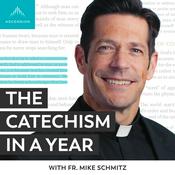22 afleveringen

Why in the Word? | A Behind the Scenes Recap of Season 1
11-6-2025 | 13 Min.
What in the Word? wraps up a rich and thought-provoking first season. In this special finale, host Kirk E. Miller turns the mic on himself, as Matt Barrios, the show’s producer, leads a reflective interview covering lessons learned, favorite passages, surprising insights, and behind-the-scenes moments.From tackling tough texts like Genesis 6, 1 Corinthians 15, and the Canaanite conquest to unforgettable interviews with scholars like Carmen Imes, Lynn Cohick, and Mike Horton, this recap offers a meaningful look back—and a peek forward at what’s to come in Season 2.Explore more: https://www.logos.com/grow/witw-season-1-recap?utm_campaign=show-witw&utm_source=spotify&utm_medium=social

Is the Song Allegorical? | Fellipe do Vale on Song of Solomon
04-6-2025 | 47 Min.
What’s the Song of Solomon really about? Is the Song a literal love poem, an allegory of God’s love, or something in betweenIn this episode of What in the Word?, Kirk E. Miller is joined by Fellipe do Vale to explore the interpretive challenges of one of the Bible’s more difficult books. They examine the Song of Song's character dynamics, imagery, and theological purpose as wisdom literature.Discover how the Song contributes to a biblical vision of love and redemption.Learn more and get special offers from Logos: https://www.logos.com/grow/witw-song-of-solomon?utm_campaign=show-witw&utm_source=spotify&utm_medium=socialDisclaimer: Logos values thoughtful and engaging discussions on important biblical topics. However, the views and interpretations presented in this episode are those of the individuals speaking and do not necessarily reflect the official position of Logos. We recognize that Christians may hold different perspectives on this passage, and we welcome diverse engagement and respectful dialogue.Outline:00:00 Introduction: The Song of Solomon Debate00:57 Meet Dr. Felipe Devele01:25 Felipe's Journey and Specialization02:30 Diving into the Song of Songs04:03 Overview and Challenges of Interpretation06:17 Historical and Theological Context10:52 Debates and Interpretations20:34 Marriage as a Metaphor in Scripture24:09 Exploring the Song of Songs24:50 Biblical Imagery in the Song of Songs25:49 The Garden and Temple Imagery29:13 Human and Divine Love in the Song of Songs31:30 Edenic Imagery and Redemption39:57 The Power of Love and Its Theological Implications43:23 Conclusion and Final Thoughts

What Does It Mean to Work Out Our Salvation? | Lynn Cohick on Philippians 2:12–13
28-5-2025 | 53 Min.
In this episode of What in the Word?, Lynn H. Cohick joins Kirk E. Miller to unpack Paul's exhortation in Philippians 2:12–13.What does it mean to “work out your salvation with fear and trembling”? Does this imply salvation is earned? How do we reconcile Paul’s call to action with his insistence elsewhere that salvation is not by works?Together, Kirk and Lynn explore the passage’s literary and theological context, its implications for how we think about salvation and sanctification, and how this text shapes the Christian life.Explore more: https://www.logos.com/grow/witw-work-out-your-salvation?utm_campaign=show-witw&utm_source=youtube&utm_medium=socialDisclaimer:Logos values thoughtful and engaging discussions on important biblical topics. However, the views and interpretations presented in this episode are those of the individuals speaking and do not necessarily reflect the official position of Logos. We recognize that Christians may hold different perspectives on this passage, and we welcome diverse engagement and respectful dialogue.Episode outline:00:00 Introduction to Paul's Teachings on Salvation00:28 Show Introduction and Listener Engagement01:03 Guest Introduction: Dr. Lynn Cohick01:39 Dr. Cohick's Background and Work03:59 Context of Philippians and Paul's Relationship with the Philippians08:47 Analyzing Philippians 2:12-1310:44 Understanding Salvation in Paul's Writings18:03 Theological and Ethical Implications of Salvation23:11 Working Out Salvation: Practical Insights26:23 The Whole Body Experience of Salvation27:30 The Process of Sanctification28:16 Community and Salvation29:14 Unity in the Church32:35 The Role of Citizenship in Philippians39:18 Fear and Trembling in Salvation43:12 Grace, Works, and Salvation50:30 Practical Applications and Teaching52:22 Conclusion and Call to Action

Did Jesus Falsely Predict His Return? | Jeannine Brown on Matthew 16:28
21-5-2025 | 58 Min.
In this episode of What in the Word?, Kirk E. Miller is joined by New Testament scholar Jeannine Brown to explore one of Scripture’s most challenging passages: Matthew 16:28. Did Jesus mistakenly predict his return?Together, they examine various interpretations—such as the transfiguration, the resurrection, Pentecost, the fall of Jerusalem, and the second coming—and discuss the most compelling understanding of Jesus’s words. Tune in to gain clarity and learn how to apply and teach this often-misunderstood verse.Learn more and explore special offers from Logos: https://www.logos.com/grow/witw-did-jesus-falsely-predict-his-return?utm_campaign=show-witw&utm_source=spotify&utm_medium=socialDisclaimer: Logos values thoughtful and engaging discussions on important biblical topics. However, the views and interpretations presented in this episode are those of the individuals speaking and do not necessarily reflect the official position of Logos. We recognize that Christians may hold different perspectives on this passage, and we welcome diverse engagement and respectful dialogue.Episode outline: 00:00 Introduction to the Controversial Passage00:57 Meet Dr. Jeannine Brown02:45 Diving into Matthew 16:2803:56 Context and Interpretive Challenges13:42 Exploring Different Interpretations18:33 The Transfiguration View23:18 The Resurrection View23:34 Pentecost and the Coming of the Spirit28:15 The Spread of the Kingdom28:55 Exploring the Elusive Pentecost Idea29:15 Mission's Discourse and the Son of Man29:55 Witnessing in Jerusalem and Beyond31:02 Destruction of the Temple and Daniel's Prophecy33:54 Interpretations of the Son of Man's Coming37:53 Daniel's Vision and Jesus' Vindication51:21 Practical Significance and Teaching Recommendations57:15 Final Thoughts and Encouragement

Where Did Satan Come From? | Phillip Cary on Genesis 3
14-5-2025 | 52 Min.
If God is good and created all things good, where did evil come from? In this episode of What in the Word?, Phillip Cary joins Kirk E. Miller to explore Genesis 3 and the origins of evil.Where did the serpent—this cunning adversary and deceiver—come from? And how could Adam and Eve, who created good and without sin, fall into its temptation? What does the Bible teach about God’s relationship to evil?Learn more and get special offers from Logos: https://www.logos.com/grow/witw-where-did-satan-come-from?utm_campaign=show-witw&utm_source=spotify&utm_medium=socialEpisode outline:00:00 Introduction to the Cunning Serpent00:18 Meet Dr. Phillip Cary00:25 Support and Subscribe01:01 Introduction to the Show01:23 Dr. Philip Carey's Background02:40 The Origin of Evil in Genesis03:46 Reading Genesis 3:1-705:05 Philosophical and Theological Issues of Evil06:29 Augustine's Perspective on Evil11:18 Corruption and Deprivation15:58 The Problem of Evil16:48 Historical Viewpoints on Evil17:16 The Serpent and Satan18:14 Revelation and the Fall of Satan25:19 Exploring the Invisible Heavens26:50 Augustine's Interpretation of Light in Genesis28:38 The Fall of Satan and the Origin of Evil37:17 The Role of Free Will in Sin41:27 Adam, Eve, and the Serpent: A Deeper Look48:55 Practical Takeaways for Christians50:59 Conclusion and Final Thoughts
Meer Religie en spiritualiteit podcasts
Trending Religie en spiritualiteit -podcasts
Over What in the Word?
Luister naar What in the Word?, Christine en Gerjanne weten het (ook niet) en vele andere podcasts van over de hele wereld met de radio.net-app

Ontvang de gratis radio.net app
- Zenders en podcasts om te bookmarken
- Streamen via Wi-Fi of Bluetooth
- Ondersteunt Carplay & Android Auto
- Veel andere app-functies
Ontvang de gratis radio.net app
- Zenders en podcasts om te bookmarken
- Streamen via Wi-Fi of Bluetooth
- Ondersteunt Carplay & Android Auto
- Veel andere app-functies


What in the Word?
download de app,
luisteren.







































